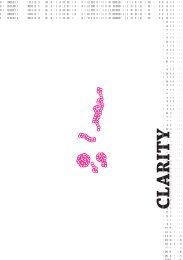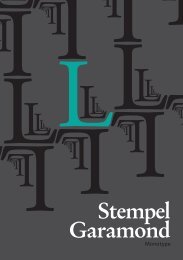Confusion
You also want an ePaper? Increase the reach of your titles
YUMPU automatically turns print PDFs into web optimized ePapers that Google loves.
[Silence]<br />
FIRST VOICE (_Very softly_)<br />
To begin at the beginning:<br />
It is spring, moonless night in the small town, starless<br />
and bible-black, the cobblestreets silent and the hunched,<br />
courters’-and-rabbits’ wood limping invisible down to the<br />
sloeblack, slow, black, crowblack, fishingboatbobbing sea.<br />
The houses are blind as moles (though moles see fine to-night<br />
in the snouting, velvet dingles) or blind as Captain Cat<br />
there in the muffled middle by the pump and the town clock,<br />
the shops in mourning, the Welfare Hall in widows’ weeds.<br />
And all the people of the lulled and dumbfound town are<br />
sleeping<br />
now.<br />
Hush, the babies are sleeping, the farmers, the fishers,<br />
the tradesmen and pensioners, cobbler, schoolteacher,<br />
postman and publican, the undertaker and the fancy woman,<br />
drunkard, dressmaker, preacher, policeman, the webfoot<br />
cocklewomen and the tidy wives. Young girls lie bedded soft<br />
or glide in their dreams, with rings and trousseaux,<br />
bridesmaided by glowworms down the aisles of the<br />
organplaying wood. The boys are dreaming wicked or of the<br />
bucking ranches of the night and the jollyrodgered sea. And<br />
the anthracite statues of the horses sleep in the fields,<br />
and the cows in the byres, and the dogs in the wetnosed<br />
yards; and the cats nap in the slant corners or lope sly,<br />
streaking and needling, on the one cloud of the roofs.<br />
You can hear the dew falling, and the hushed town breathing.<br />
Only _your_ eyes are unclosed to see the black and folded<br />
town fast, and slow, asleep. And you alone can hear the<br />
invisible starfall, the darkest-beforedawn minutely dewgrazed<br />
stir of the black, dab-filled sea where the _Arethusa_, the<br />
_Curlew_ and the _Skylark_, _Zanzibar_, _Rhiannon_, the _Rover_,<br />
the _Cormorant_, and the _Star of Wales_ tilt and ride.
Dickie
This is Richard Davies, or Dickie as he is better known<br />
to his family and friends. He was born on the 25th<br />
January 1926 in Dowlais, Merthyr Tydvil, in South<br />
Wales. Whilst essentially a coal mining area, his<br />
father was a railway guard and only his elder brother<br />
Ron, actually ‘worked down the pit’. He spent his<br />
childhood roaring about the hills riding bareback<br />
on his pony, playing chicken on the ‘cwbs’ (coal<br />
trucks that run to the end of a line to tip coal), and<br />
sliding down the main road in winter on a tin tray,<br />
which earned him a beating from his dad. From a<br />
young age Dickie was set on breaking the rules and<br />
his most hair raising stunt involved setting fire to<br />
brush wood which he and his chums used to encircle<br />
their local youth club when the adults took it over<br />
for the evening. They then sat on the roof watching<br />
the panic ensue. He moved on to bigger things again<br />
after getting involved in drama at his local youth<br />
club. He eventually moved up to London where he<br />
began his acting career. The same local youth club,<br />
whilst hardly a formal drama school, produced some<br />
of the greatest British male acting talents of the 20<br />
century; Richard Burton, Anthony Hopkins and Roger<br />
Moore all started in the same youth club. He took his<br />
stage name from his first radio performance as Dicky<br />
bach dwll’.
His first job was with the Pilgrim Players during the war,<br />
and he married the daughter of his landlady, Beryl and<br />
had a son, Colin, before the army caught up with him,<br />
and he was sent to train for the military police, riding a<br />
motorbike, and destined for Burma. The captain of the<br />
CSEU, Combined Services Entertainment Unit, who<br />
Dickie had met earlier in the war, pulled him out, and he<br />
spent the rest of the war entertaining the troops with<br />
plays. Shakespeare wasn’t popular, and they would hear<br />
the squaddies stamping out, loudly half way through.<br />
He came back to London, and appeared on stage in<br />
‘Carrington VC.’ He made a film, later, ‘The Night my<br />
Number came up’ with Michael Redgrave. In 1952, he<br />
toured South Africa with the Old Vic, and met his 2nd wife<br />
on a one week engagement on the Isle of Man, in 1955.<br />
They have two children and four grand children.
Dickie is probably best known for his performance as<br />
the exasperated schoolmaster, Mr Price, in the popular<br />
London Weekend Television sit com - Please Sir! The<br />
show ran for 4 series and a total of 55 episodes between<br />
1968 and 1972. He also appeared in the spin-off series<br />
The Fenn Street Gang. He used a broad Welsh accent for<br />
much of his work, and often played Welsh stereotypes.<br />
Dickie played Idris Hopkins in Coronation Street<br />
between 1974 and 1975, and appeared in several<br />
science-fiction series, among them Robert’s Robots,<br />
Out of the Unknown and a well-received performance<br />
as Burton in the 1987 Doctor Who story Delta and the<br />
Bannermen. He played Mr White in Fawlty Towers,<br />
in the epic episode “The Kipper and the Corpse”, and<br />
also appeared in Yes Minister. He impersonated Clive<br />
Jenkins in a spoof edition of Question Time in a sketch<br />
on Not the Nine O’clock News and also appeared in<br />
One Foot in the Grave.<br />
He has appeared in films such as Zulu (1964), the<br />
musical film Oh! What a Lovely War (1969), the film<br />
adaptation of Please Sir! (1971), and Under Milk Wood<br />
(1972). His last film appearance was in 1988 where he<br />
played the schoolteacher in Queen Sacrifice.<br />
Apart from occasional appearances on radio and<br />
TV adverts, and ‘bit parts’ in TV light comedy,<br />
Dickie started to wind down his career during the<br />
1990’s largely retiring from acting by the turn of the<br />
millennium. He moved from London to Hampshire in<br />
2001 to live closer to his family.
Dickie was diagnosed with Alzheimer’s in 2004 and<br />
is now looked after in a care home local to his home<br />
in Liphook, Hampshire. His diagnosis came about<br />
following cognitive tests after a series of car accidents,<br />
which resulted in him surrendering his driving licence.<br />
They found that Dickie was experiencing the early<br />
symptoms of Alzheimer’s disease. From this point on<br />
he became progressively more dependent on his wife<br />
Jill. Dickie, scared of the prospect of being ill, stopped<br />
drinking and became a vegetarian in a bid to stave off<br />
the disease although he could still be caught eating<br />
sausages and bacon which he insisted, ‘didn’t count’.<br />
The disease began to become more prevalent from this<br />
point, characterising its self in noticeable symptoms<br />
such as wandering, memory troubles and, in particular,<br />
sleepless nights. His trouble sleeping had the most<br />
impact on those around him and took the biggest toll<br />
on his wife Jill. For Dickie, the disease manifested<br />
its self in some of his frustrations and insecurities.<br />
Having never been one to use a credit card, Dickie<br />
always had cash in his pocket, but the sudden prospect<br />
of not having money in his pocket, due to his illness<br />
and his tendency to lose things, caused him to worry<br />
constantly whether he had money to pay for his room<br />
and his food. He also has trouble walking, due to<br />
Arthritis, which fuels fears of falling, resulting in loud<br />
shouting matches as he accuses various relatives and<br />
care givers of ‘trying to kill him’.
Caring for Dickie at home began to take its toll on<br />
his wife Jill, who is not in the best of health herself.<br />
The endless fetching of cups of coffee along with<br />
difficulties getting him out of bed became too much<br />
and reluctantly she was forced to admit him into a<br />
local care home which specialises in care for dementia<br />
patients.<br />
Dickie is now 88 and a popular resident of the Silver<br />
Birches care home where he lives. His disease is not<br />
progressing fast and he still remembers much although<br />
these tend to be distant memories like his childhood,<br />
and he often mistakes children and grand children for<br />
his brothers and sisters. Remarkably, he can still recite<br />
word for word, much of the narrator’s part (although he<br />
never played it) from Dylan Thomas’s Under Milk Wood.<br />
Aside from these small surprises he only remembers<br />
select members of his family. Tragically Dickie’s<br />
confusion continues as he has mistaken one of<br />
his fellow residents for his wife Jill which at times<br />
causes him and her some distress. Despite the<br />
confusion he is still a character, lager than life, and<br />
still a bit of a tearaway often getting away with a<br />
‘shouting and hollering’ session with a cheeky smile,<br />
and the line, ‘I was only joking…’
“No knowledge of who’s good, who’s bad,<br />
who’s here to help you or who’s here to hurt you.”<br />
“Thats a scary world to live in.”
I’m not
A huge challenge faced when caring for people with<br />
Alzheimer’s is the unpredictability brought about by this<br />
lack of consistency in a person’s life. If a person cannot<br />
recollect what they did or how they felt earlier on in<br />
the day they don’t have a constant mood. As a result<br />
sufferers can have drastic mood swings.<br />
Many patients with more advanced symptoms<br />
aren’t aware that there is anything wrong with<br />
them. This makes reasoning and consoling them<br />
very difficult. The confusion faced on a daily basis<br />
can leave patients stressed and they can become<br />
aggressive in some cases.<br />
Although it feels wrong, the telling of white lies<br />
(redirection) has become a useful tool in dealing with<br />
Alzheimer’s sufferers. They are used to distract and overt<br />
a patient’s attention to calm them. It’s a hard practice<br />
for some people but deception isn’t the intent. It is a<br />
topic open to debate and something people caring for<br />
Alzheimer’s sufferers face every day; whether you deceive<br />
a person to keep them happy or whether you’re honest<br />
with them and face causing them potential distress.
The social impact of not knowing who the people<br />
around you are, can affect a person’s personality<br />
greatly. Many patients suffering with Alzheimer’s<br />
become very introvert and removed from their<br />
surroundings. The frustration and sometimes<br />
embarrassment of not knowing names and faces you<br />
should know, is difficult to deal with and some people<br />
become depressed as a result.
On the outside many Alzheimer’s sufferers,<br />
particularly in the early stages of the disease, appear<br />
normal; they can converse normally and very often<br />
lose very little of their basic skills like reading,<br />
writing and numeracy skills. It is what is happening<br />
on the inside that is the problem.<br />
It is in conversation when the discussion moves to<br />
recounting past experiences where the Alzheimer’s<br />
sufferer is often left out because their recollection is<br />
scant or maybe there is no recollection at all – you can’t<br />
join in if you cant remember. Places, names and dates<br />
all become more and more difficult to recall, and then<br />
eventually not at all. As a result the Alzheimer’s sufferer<br />
can feel more and more isolated, embarrassed and alone<br />
whilst struggling to come to terms with their disease.<br />
Once diagnosed sufferers pick up a label that leads<br />
to more humiliation “its ok he forgets things”,<br />
“He’s not the same man I married”, “it’s ok he<br />
won’t understand”. All innocent comments but with<br />
a wounding and degrading effect on the person.<br />
Sufferers are often treated as if they can’t understand<br />
any thing at all, when they actually understand nearly<br />
all of what is being said – they just don’t remember.<br />
When Alzheimer’s becomes more severe, patients<br />
often lose track of time and place. Not knowing<br />
where you are often creates the greatest frustration in<br />
patients “where is this?”, “when are we going home?”,<br />
“do you live here as well?”
With thanks to<br />
Jill Davies<br />
The staff of Silver Birtches residential care home<br />
The Alzheimer’s Society<br />
And of course<br />
Dickie
_Curlew_ and the _Skylark_, _Zanzibar_, _Rhiannon_, the _Rover_,<br />
the _Cormorant_, and the _Star of Wales_ tilt and ride.<br />
Listen. It is night moving in the streets, the processional<br />
salt slow musical wind in Coronation Street and Cockle Row,<br />
it is the grass growing on Llaregyb Hill, dewfall, starfall,<br />
the sleep of birds in Milk Wood.<br />
Listen. It is night in the chill, squat chapel, hymning in<br />
bonnet and brooch and bombazine black, butterfly choker and<br />
bootlace bow, coughing like nannygoats, sucking mintoes,<br />
fortywinking hallelujah; night in the four-ale, quiet as a<br />
domino; in Ocky Milkman’s lofts like a mouse with gloves;<br />
in Dai Bread’s bakery flying like black flour. It is to-night<br />
in Donkey Street, trotting silent, With seaweed on its<br />
hooves, along the cockled cobbles, past curtained fernpot,<br />
text and trinket, harmonium, holy dresser, watercolours<br />
done by hand, china dog and rosy tin teacaddy. It is night<br />
neddying among the snuggeries of babies.<br />
Look. It is night, dumbly, royally winding through the<br />
Coronation cherry trees; going through the graveyard of<br />
Bethesda with winds gloved and folded, and dew doffed;<br />
tumbling by the Sailors Arms.<br />
Time passes. Listen. Time passes.<br />
Come closer now.<br />
Only you can hear the houses sleeping in the streets in the<br />
slow deep salt and silent black, bandaged night. Only you<br />
can see, in the blinded bedrooms, the coms. and petticoats<br />
over the chairs, the jugs and basins, the glasses of teeth,<br />
Thou Shalt Not on the wall, and the yellowing dickybird-watching<br />
pictures of the dead. Only you can hear and see, behind the<br />
eyes of the sleepers, the movements and countries and mazes<br />
and colours and dismays and rainbows and tunes and wishes<br />
and flight and fall and despairs and big seas of their dreams.








